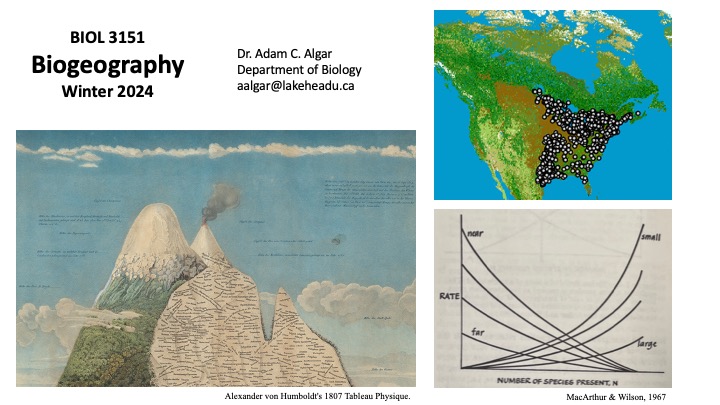Follow us on Instagram: @Ecto.Eco.Evo

"I know more than I did before, but now I have more questions"
- Anonymous lab member & MSc student


- Anonymous lab member & MSc student
Dr. Adam C. Algar (he/him), Associate Professor
I joined the Department of Biology at Lakehead in January 2021, having spent the 10 years prior at the University of Nottingham (UK). As a kid
growing up on northern Cape Breton Island (Nova Scotia, Canada), chasing birds around the forests and mountaintops, I never imagined
that my fascination with the natural world could be turned into a career that would lead me to work and live in three countries and do
fieldwork on three continents. Along the way, I've learned the importance of scientific thinking for understanding the world around us, and the power of big data and statistical models for testing ecologial theory. And even though I work mostly with lizards and frogs, I still love chasing birds.
I am excited to be back in Canada, especially in the remarkable environment around Thunder Bay, which rivals any place in the world I've been for the beauty of its landscape,
the wonder of its wildlife, and the potential for new ecological discoveries.
If you're interested in working with me, either as an undergrad, or for a Master's, PhD, Post-Doc, or just a research visit, please contact me as early as possible so we can talk projects and funding. I can be reached at aalgar@lakeheadu.ca.
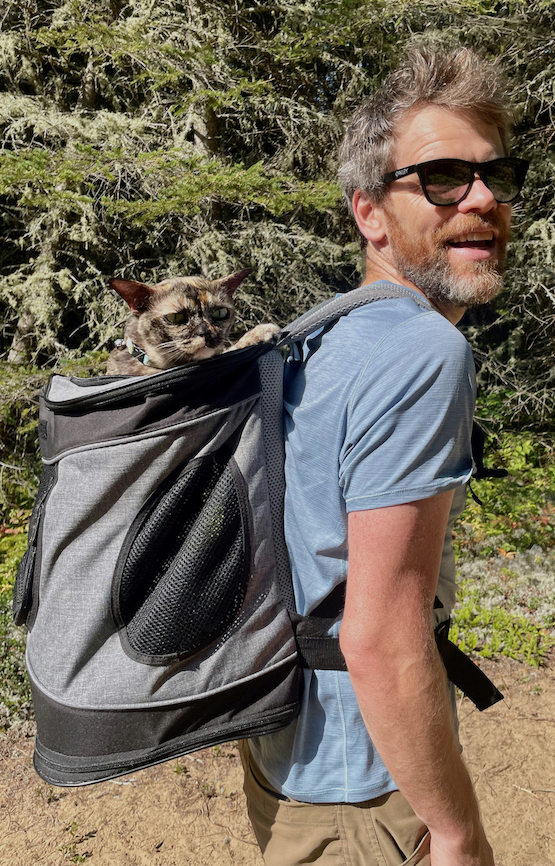
Amy Klassen
Amy started her MSc Biology in January 2025, after completing her undergraduate degree at the University of Winnipeg. Her research is examining how environmental change is influencing acoustic of individuals species and community soundscapes.

Abby Sim
Abby is an MSc Biology student. She did her undergradaute degree at Mount Royal University and then worked in agricultural research before starting her MSc. Abby is working on breeding habitat selection at the northern range limits of Eastern Gray Treefrogs
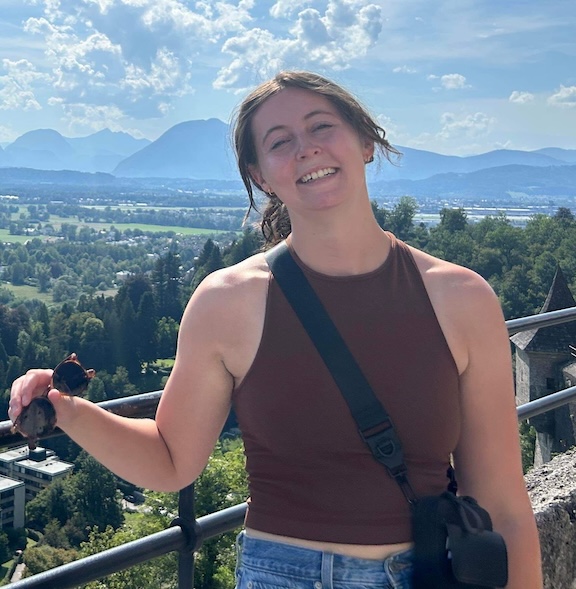
Firas Dib
Firas is an MSc Biology student. Firas did his BSc at Dalhousie University in Haliax, NS and has done stints of field work in the boreal forest and with herps. Firas joined the lab in September and will be working on physiological constraints and range shifts of amphibians. . . probably Eastern Gray Treefrogs.
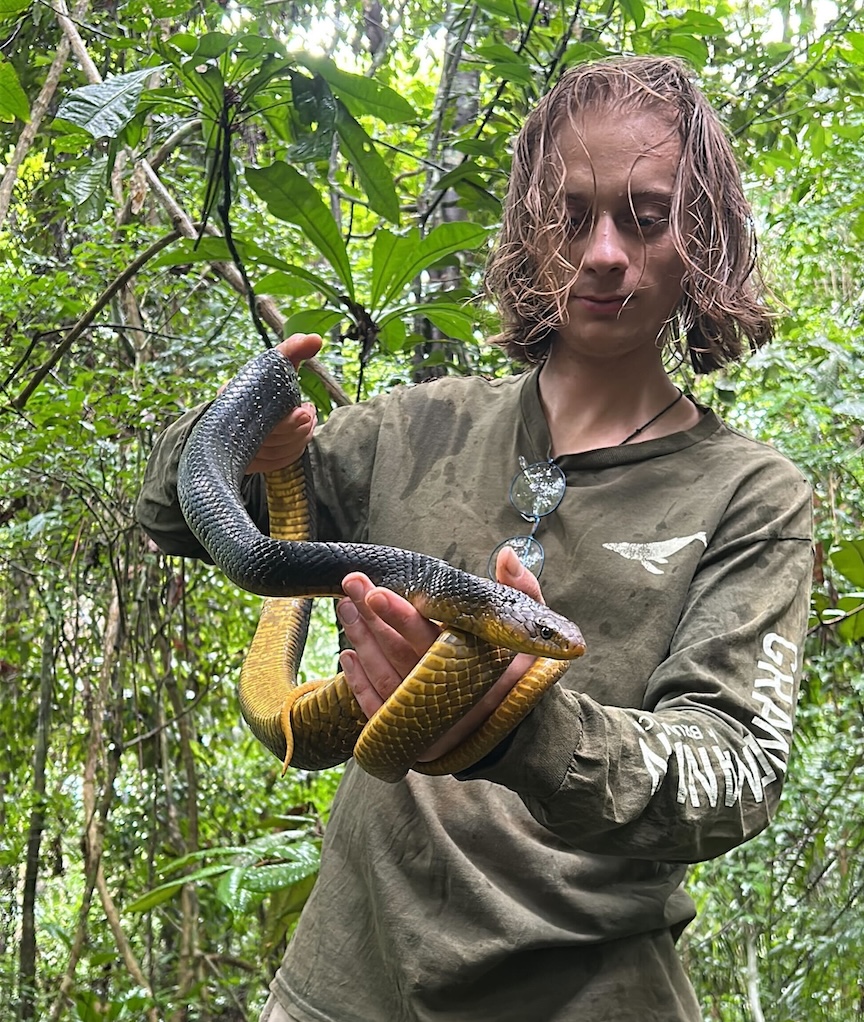
Keiran KeagStrong
Keiran helped out with field work in the summer of 2025 and is now working on his Honours Thesis. His research focuses on metabolic theory of ecology and broad-scale variation in amphibian calling characteristics.
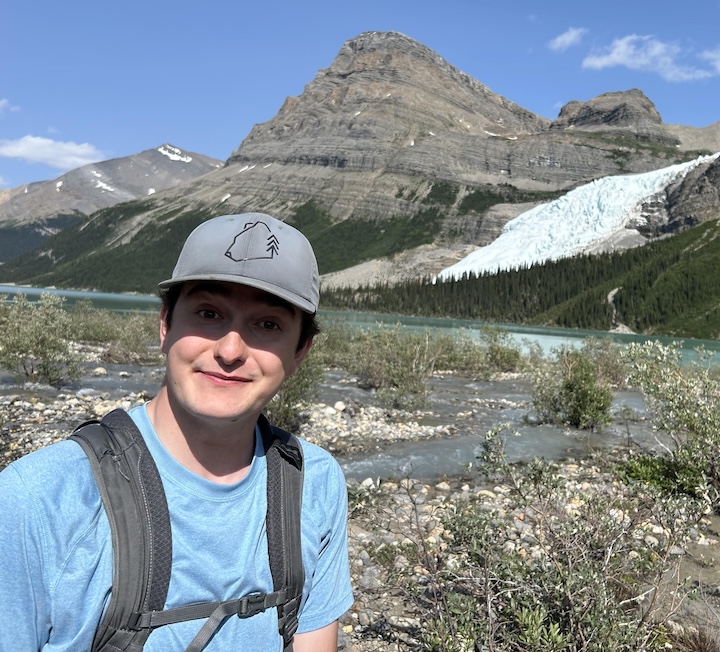
Melissa Henderson
MSc 2023-2025. Physiological costs of altered hycrothermal conditions in harvested forests.
Ryley Marchant
MSc 2023-2025. Predator-prey interactions under thermal pressure.
Dr. Henry Fell
Post-Doc. 2022-2025. NERC project: Modelling soil as a reservoir for plague survival and re-emergence in Madagascar"
PhD: 2017-2022: Climatic controls on plague (Yersinia pestis) using palaeobiogeographical modelling and experimental microbiology.
Isabella Bosch
UG Honour's Thesis & NSERC USRA. 2024-2025. Evaluating concordance of thermal performance curves in the field and lab.
Marjorie Robinson
NSERC USRA. September 2025. Confounding effects of weight loss on dehydration-performance relationships in frogs
Ekaterina Leschetnaya
UG Honour's Thesis. 2024-2025. Rewiring avian communities: the influence of climate change on bird co-occurence networks.
Marissa Brosseau
UG Honour's Thesis. 2024-2025. The importance of climate and forest cover in determining boreal amphibian distributions.
Scarlett Hanley
UG Honour's Thesis & NSERC USRA. 2024-2025. Climate change and black-legged ticks in Thunder Bay: assessing life stage transition success in Ixodes scapularis
Katie Lockhart
MSc. 2022-2024. Exploring breeding season phenology of the Eastern Gray Treefrog (Dryophytes versicolor)
Olivia Leach
UG Honour's Thesis & NSERC USRA. 2022-2024. Terminal reproductive investment in male gray treefrogs (Dryophytes versicolor): a marathon not a sprint
Brianna Boucher
UG Honour's Thesis. 2023-2024. Synchronicity and latitudinal variation in boreal frog breeding seasons
Dez Roy
UG Honour's Thesis. 2023-2024 Evaporative water loss and the quality of coniferous and deciduous microhabitats: Dryophytes versicolor.
Kate Butt
NSERC USRA. 2023 Dehydration reduces clinging ability of an arboreal amphibian.
Hannah Malloy
UG Honour's Thesis. 2022-2023 Photography as an alternative to tagging for mark-recapture studies of a colour-changing amphibian.
Brennan Oliver
UG Honour's Thesis. 2022-2023 Climate limitations in range expansion of reptiles and amphibians into Canada.
Alexandra Grillo
UG Honour's Thesis. 2022-2023 Evolution of climatic range limitation in the true toads (Bufonidae).
Nathan Timmerman
UG Honour's Thesis. 2022-2023 The hydrothermal ecology of the gray treefrog, Dryophytes versicolor.
Dr. Rachel Gunn
PhD. 2018-2022 Understanding the drivers and consequences of behavioural variation in coral reef fish under environmental change.
Sydney-Lyn Bernardi
UG Honour's Thesis. 2021-2022. Predicting the northern range edge of Hyla versicolor using macro- and microc-limate niche models.
Dr. Emma Higgins
PhD. 2017-2022. Anoles & drones: revealing controls on anole abundance and mapping sub-canopy thermal habitat using remote sensing, on the island of Utila, Honduras.
Dr. Vanessa Cutts
PhD. 2017-2022. Environmental drivers of endemism in the Canary Islands: linking traits to island theory.
Dr. Owen Osborne
Post-doc. 2018-2021. Part of the FOREWALL project: Forecasting potential biodiversity losses in Wallacea from ecological and evolutionary patterns and processes
Dr. Alastair Munro
PhD. 2016-2021. Long-term spatiotemporal changes in endemic threshold populations in England and Wales
– a multi-disease study.
Dr. Simon Tarr
PhD. 2015-2020. Evaluating the effects of climate change and biotic
interactions on terrestrial ectotherms through time and space.
Dr. James Hicks
PhD. 2014-2019. Thermal and functional responses of dragon lizards
to land use and climate change in peninsular Malaysia.
Dr. Roberto Santos
PhD. 2014-2018. Environmental and cultural influences on the
geography of genetic variation in Bambara groundnut.
Lorenzo Maria Iozia
Erasmus visiting researcher. 2019-2020. Climatic niche parameters and physiological tolerances of ectotherms.
Tom Brown
Master's. 2019-2020. Ecological responses of the endemic anole, Anolis bicaorum, to
rapid habitat degradation on Utila Island, Honduras.
Mollie Craig
Master's. 2019-2020. Climatic variation and the spread of west-nile virus.
Ryan Clark
Master's. 2017-2018. Linking form, function and microhabitat use of chameleons
along a disturbance gradient in Madagascar.
Suzanne Keddie
MSci. 2016-2017. Predicting global niche dynamics of human
disease vectors.
Kate Morley
Master's. 2014-2016. Predictive models of lizard body temperatures
at global scales.
Jack Starbuck
Master's. 2014-2016. The spatial scale of community assembly worldwide.
Dr. Joe Bailey
Master's. 2012-2013. Global patterns of trait convergence in turtle assemblages worldwide.
Dr. Adison Altamirano
Post-doc. 2011-2012. Climate and land cover changes and species distributions in Chilean forests.
Pancake
Pancake is an 11-year-old (European) Burmese. Born in the UK, she moved with the lab from the University of Nottingham in 2021 and still does not understand
why she did not have her own seat in first class for the journey. Pancake enjoys sleeping, stress-eating, riding in a backpack on hikes, camping, saunas,
being with her two humans, and committing random acts of violence. She does not enjoy cold feet, rain, children, other cats, or being ignored.
Fortunately, she is too uncoordinated to successfully hunt anything.

Cattie
Cattie has an awesomely apt name and is a youthful 21 years old (we think). Born on the streets, she decided one day in 2005 that her fur-ever home was with Amy and her family. Most hours of most days are spent sleeping, but Cattie also enjoys chasing kibble (kibble can't run very fast, so the chase doesn't sound exciting, but remember that Cattie is 21, so its a more even match than you'd think). Cattie also needs an inhaler which somehow makes her even cuter. Other cute traits include waking her family up at 4am

Sapphire
Sapphire is a sweet old lady cat (Keiran's description, not mine). At 18 years of age, she really enjoys sleeping and sitting next to warm objects. She is very social and likes everyone (so is either not actually a cat, or is up to something). She definitely loves Keiran though. She runs to greet him when he gets home and stays by his side non-stop. This is either very sweet or obsessively controlling. You be the the judge.

Gem
Gem is not a cat. She is a Hanovarian-Arabian horse whom, with Ryley, showed at the fourth
level in dressage. You can tell Gem is not a cat because she is a big fan of people, children,
and dogs. Gem is not a fan of miniature ponies, pigs, or bicycles, but will befriend anyone
holding a carrot.
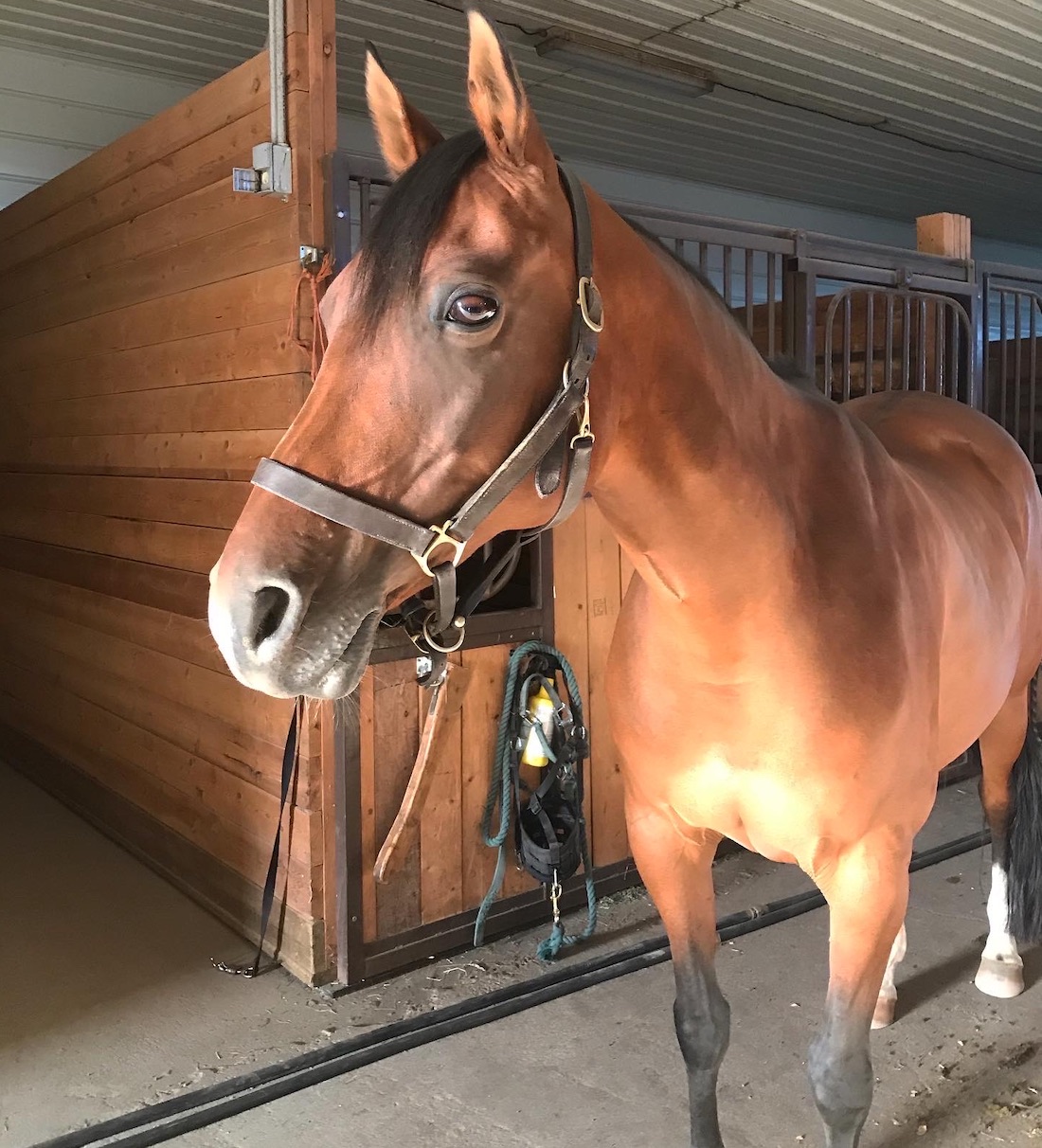
Ellie
Ellie is not a cat, she is a beagle-border collie mix that grew up during covid. Thus she is not a fan of people outside of her
family and has not yet accepted that they no longer work from home every day. Ellie loves bouncing through tall grass,
swimming, cuddles, and getting anxious. She is a great work buddy as long as Riley is not actually trying to get any work done.
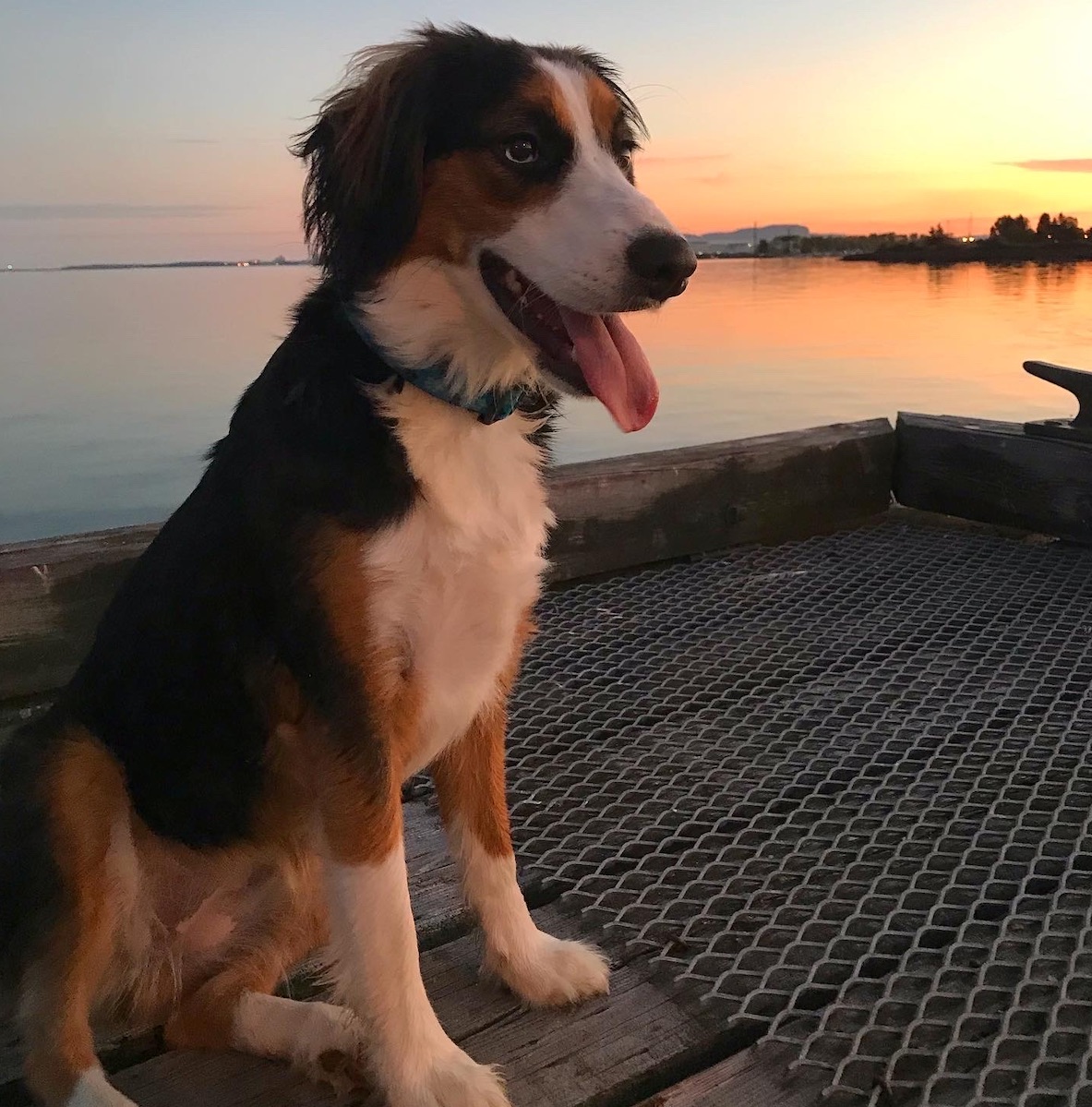
Ruby
Ruby is not a cat. She's a cockapoo who loves snuggles, exploring the Welsh countryside, Dr. Emma Higggins, and cheese. Especially cheese. She also pretends to have no interest
in science, but we know the truth.

Willa
We're sorry but Willa isn't a cat. She is a Norwegian Bohund. Her favourite thing (except for Isabella, we assume) is snow which makes her great for Thunder Bay (except for 2024, but we don't talk about that 'winter'). She loves to submarine under the snow and lay in it, especially
when it's time to go inside. Willa also loves to hike, especially when there are sticks to carry the entire way!
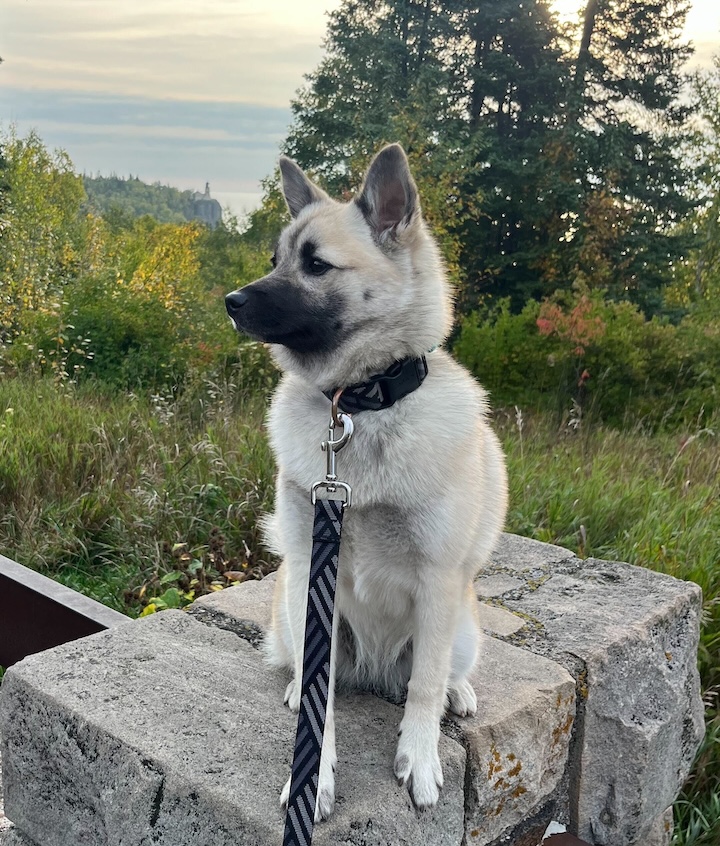
Mobley-Taters & Nelson
Mobley-Taters and Nelson are both definitely cats! We know both are partly Siamese, but we don't know which is Nelson and which is Mobley-Taters (presumably Marjorie does!). Mobley-Taters is a biscuit-baker who enjoys cat TV, chin scratches and stealing towels (why? Is there a market for stolen towels?). Nelson has an attitude and a belly. His hobbies include crinkling wrappers and sneaking up on his
brother to poke him. It seems Nelson is a little bit evil and so is probably the top one.
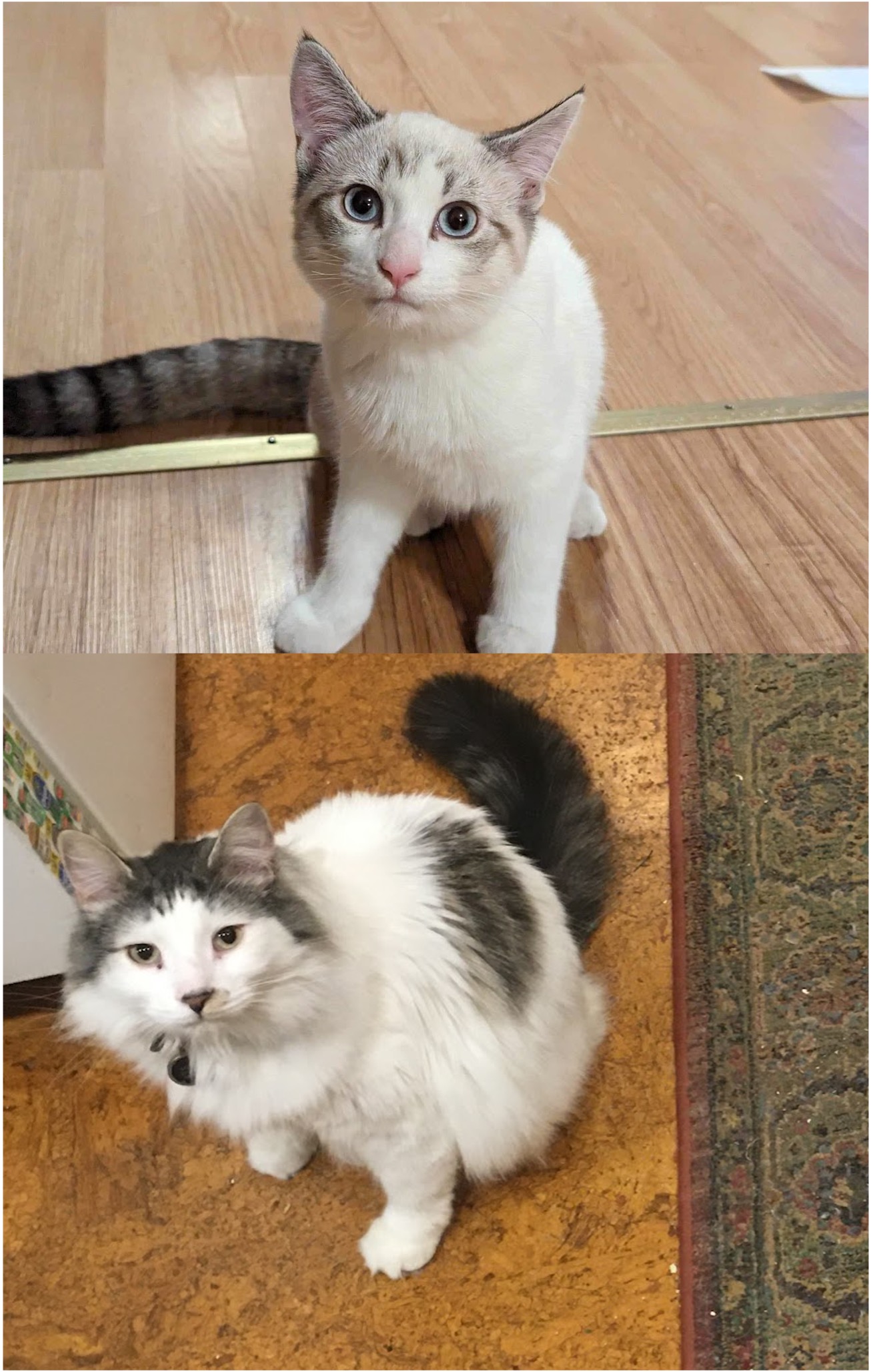
Echo
Dez's hypothesis is that Echo is a Bombay. The solid black coat, large golden eyes, and muscular
build are consistent with this hypothesis. If other Bombay traits include being afraid of squeaky toys, rummaging in the garbage
and spreading trash all over the house, and waking up under the sofa and crying because you don't know where you are, then it seems like a
pretty solid hypothesis.
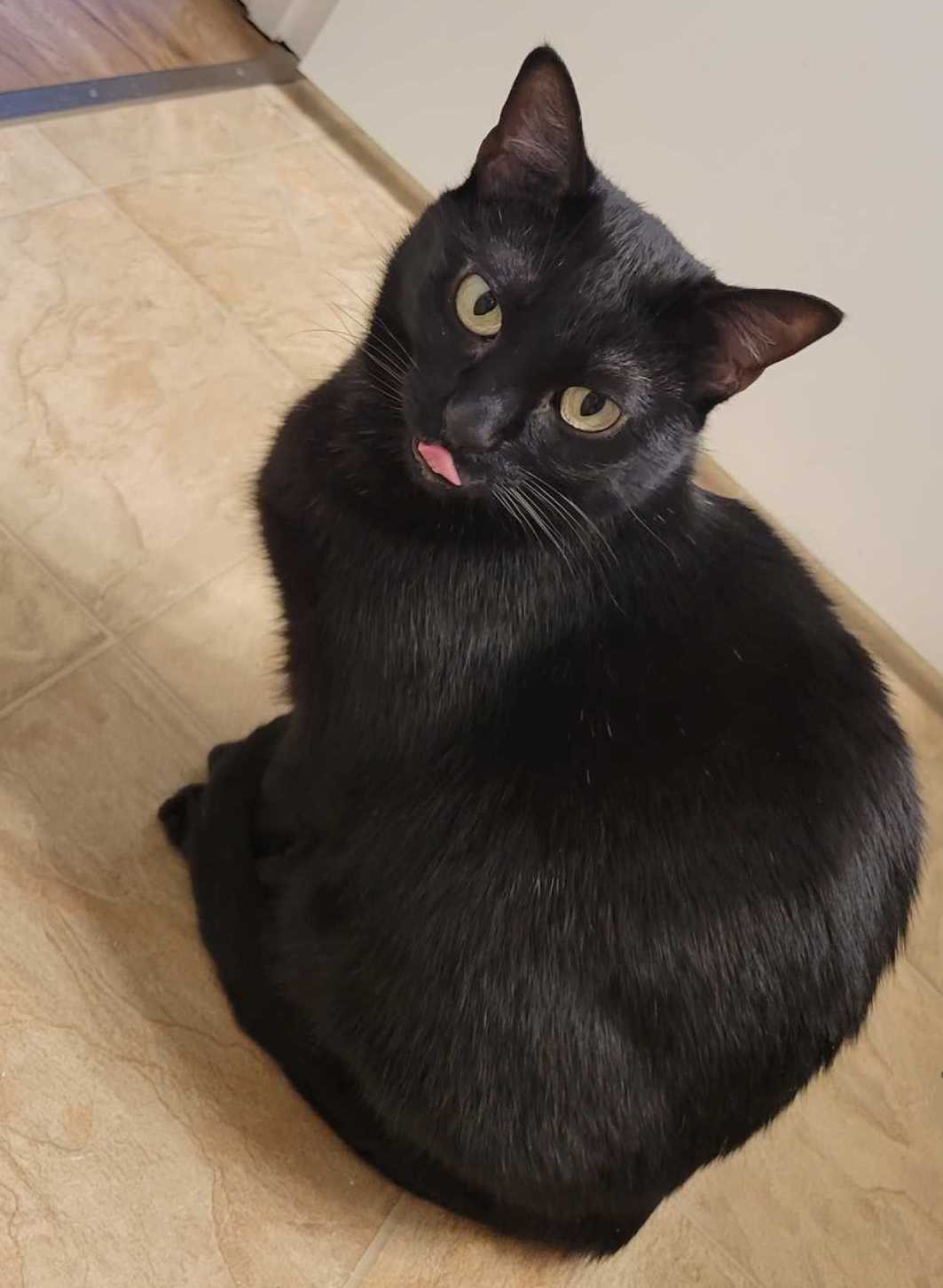
Emma
Emma is a dog, not a cat (allegedly). She has anxiety, plus three blankets that must be wrapped around her for comfort at (almost) all times.
She does not like (other) dogs. She does love eating, and snuggles. But her favourite thing is getting all up in Brianna's (and her mom's) personal space.

Billie
Billie is not a cat. In fact, the app Seek (by iNaturalist) thinks Billie is a domestic guinea pig. However, Billie is actually a
dog whose feet turn out in a really adorable way. Billie's favourite things are Katie. Her least favourite things are Not Katie.

Louie
Louie is not a cat. He is an Australian shepherd, but he's never been to Australia and has never seen a sheep.
However, he'd probably be really good at herding them. He is good at solving puzzles and at
eating things he's allergic to. While getting hives may be a useful skill in some situations, the former is probably more valuable,
especially if Olivia gets trapped down a well.
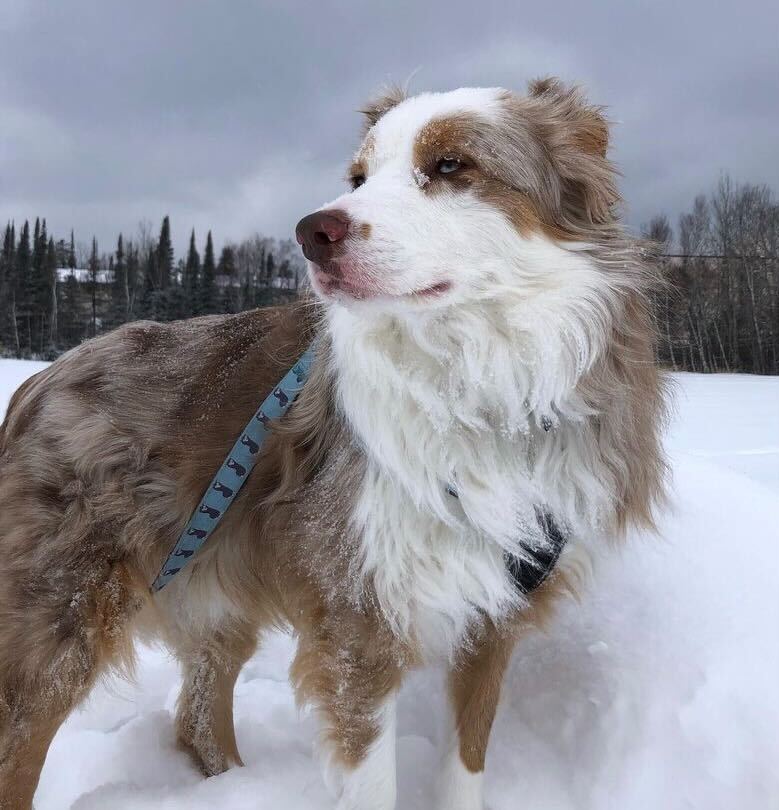
Drita
Drita is, despite Scarlett's insistence, not a cat. She is a mysterious rescue pup whose breed(s) is unknown though, so who knows.
Although she weighs 27kg, she is a pro at being Scarlett's lap dog. When young, Drita was a whirlwind of energy but now she has embraced the wisdom of the cat nap - suggesting that
she wants to be part of the cat club. . . but then again, who doesn't??

On a tiny island in the Caribbean, a small lizard hides from the beating sun underneath a palm frond.
On a Scottish moor, a butterfly lazily stretches out its wings in the summer sunshine. And on the
shores of Lake Superior, a small frog burrows into the leaf litter as the world freezes around it. No
matter where they live, the lives of 'cold-blooded' species are a never-ending thermal balancing act,
where tipping too far to the warm or cold can have deadly consequences, but getting it right can have
great rewards.
The interaction between an organism's thermal environment and its thermal niche reverberates across all
ecological scales: an individual organism may select shaded microhabitats and avoid sunny ones, a
population may persist only in cool, closed canopy forest and not at hotter forest edges, or a species'
range may not extend beyond the 0°C isotherm. A major goal of our research is to understand how processes
involving individuals produce broad-scale, general ecological patterns through space and time. To achieve
this we integrate macroecological and macroevolutionary approaches with physiological, functional, and
community ecology to determine what sets limits on species' distributions, how these limits have evolved and
importantly whether we can predict how they will respond to future environmental changes.
Study Systems
Our research is question, not system, driven, so we don't work in a single study system, but rather choose a system
that allows us to test our hypothesis effectively (and, hopefully, one that we think is pretty cool as well). That
said, much of our current work is focused on amphibians, but we have considerable experience with tropical lizards, and have
worked on systems as varied as invasive crayfish in the UK, endemic plants of the Canary Islands, and even human
disease.
Gray Treefrogs (Hyla versicolor)
Establishing the lab at Lakehead has opened an opportunity to work with species and habitats in Northwestern Ontario.
The gray treefrog is one that we are extremely excited about. Why? Well, firstly, this species' range extends all
the way from Texas to Northwestern Ontario; any species that inhabits such a range of environments must be harbouring
some fascinating eco-evolutionary secrets. Secondly, gray treefrogs have actually been expanding their range
northward in the Thunder Bay region over the past decade, which again suggests interesting ecological and evolutionary
dynamics playing out in geographical space. Thirdly, the importance of moisture and temperature (hydrothermal niche)
for amphibians, alongside their distinct larval (tadpoles) and adult modes of life add exciting dimensions to the
study of their range limits. And fourthly, I just really like arboreal ectotherms with toepads.
Lizards
Lizards have long been a workhorse of thermal and evolutionary ecology. Combine this with recent advances in
mapping their distributions and resolving their phylogeny and lizards are an excellent group of animals to
try to understand the links between thermal environment, ecological niches and geographic distributions. We
have done extensive work on the geographical ecology of Anolis of the Caribbean and Central/South American
mainland, but there is still considerable potential for novel insights from old questions and new hypotheses with
this system, taking either macroecological or field-based approach (or both). In addition to Anolis, we
have worked with (and would love to again) the endemic Gallotia lizards of the Canary Islands, and
with Agamid lizards in Southeast Asia.
Microclimate for modelling macroecology
One of the challenges of understanding and predicting how species respond to climate change is that organisms
do not experience climate, at least not how it is traditionally measured and modelled. Instead, animals experience microclimate,
which can very remarkably even over very small spatial and temporal scales. This variation was beautifully
captured by Charles Dickens in Great Expectations: "It was one of those March days when the sun
shines hot and the wind blows cold: when it is summer in the light, and winter in the shade." Our work
in this area has focused on using remote sensing by drones and satellites to improve our ability
to model animal operative temperatures at fine resolutions to understand how thermal landscapes contribute to changes in species
distributions through space and time.
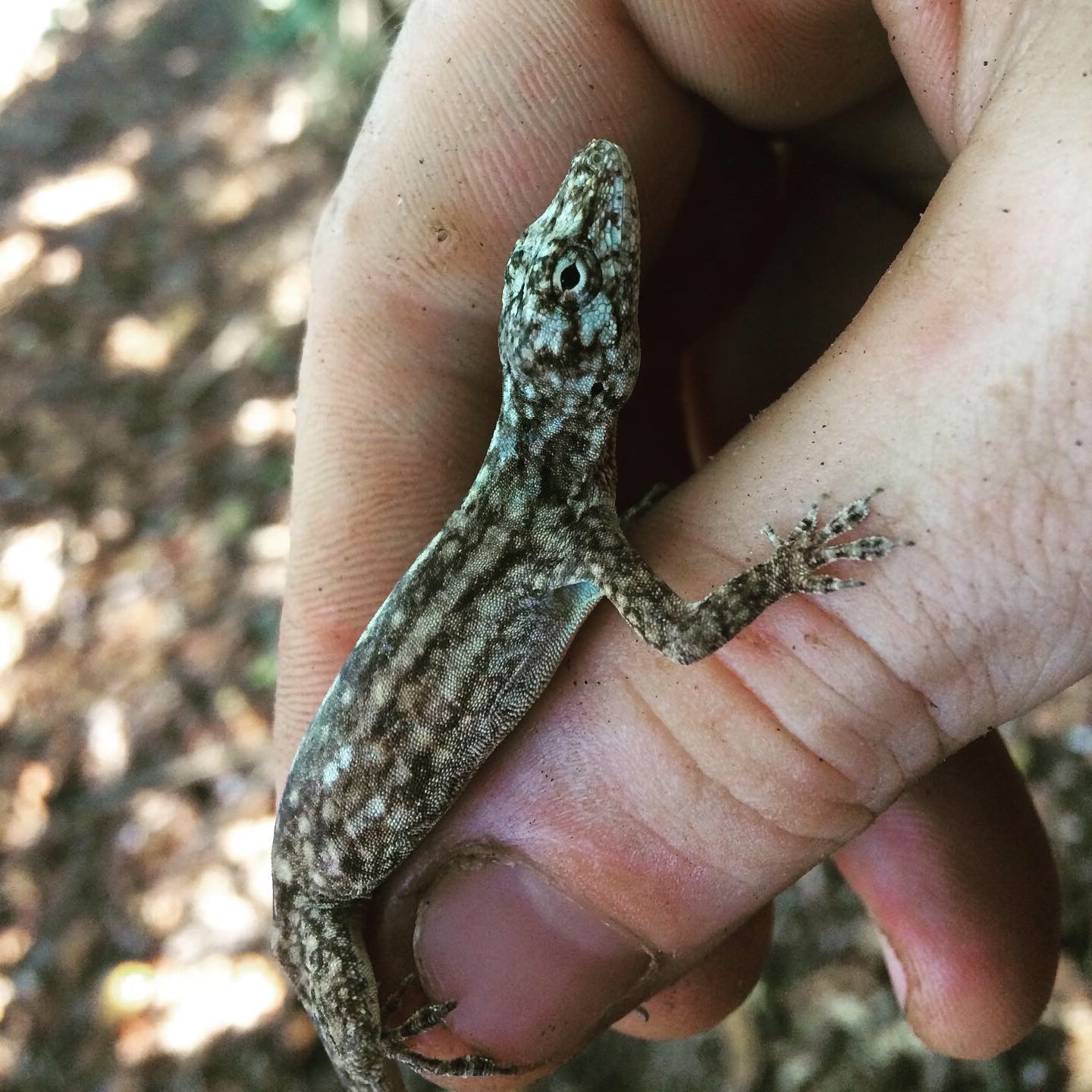
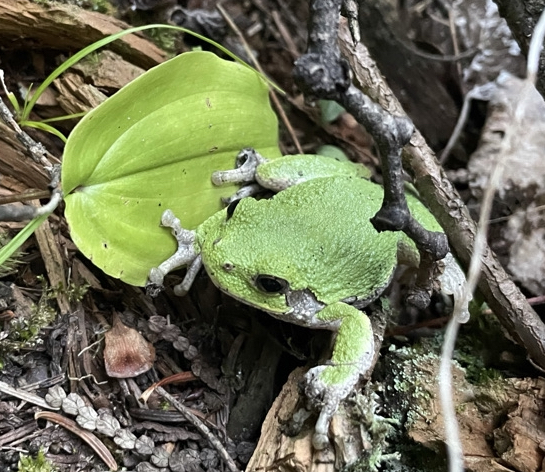
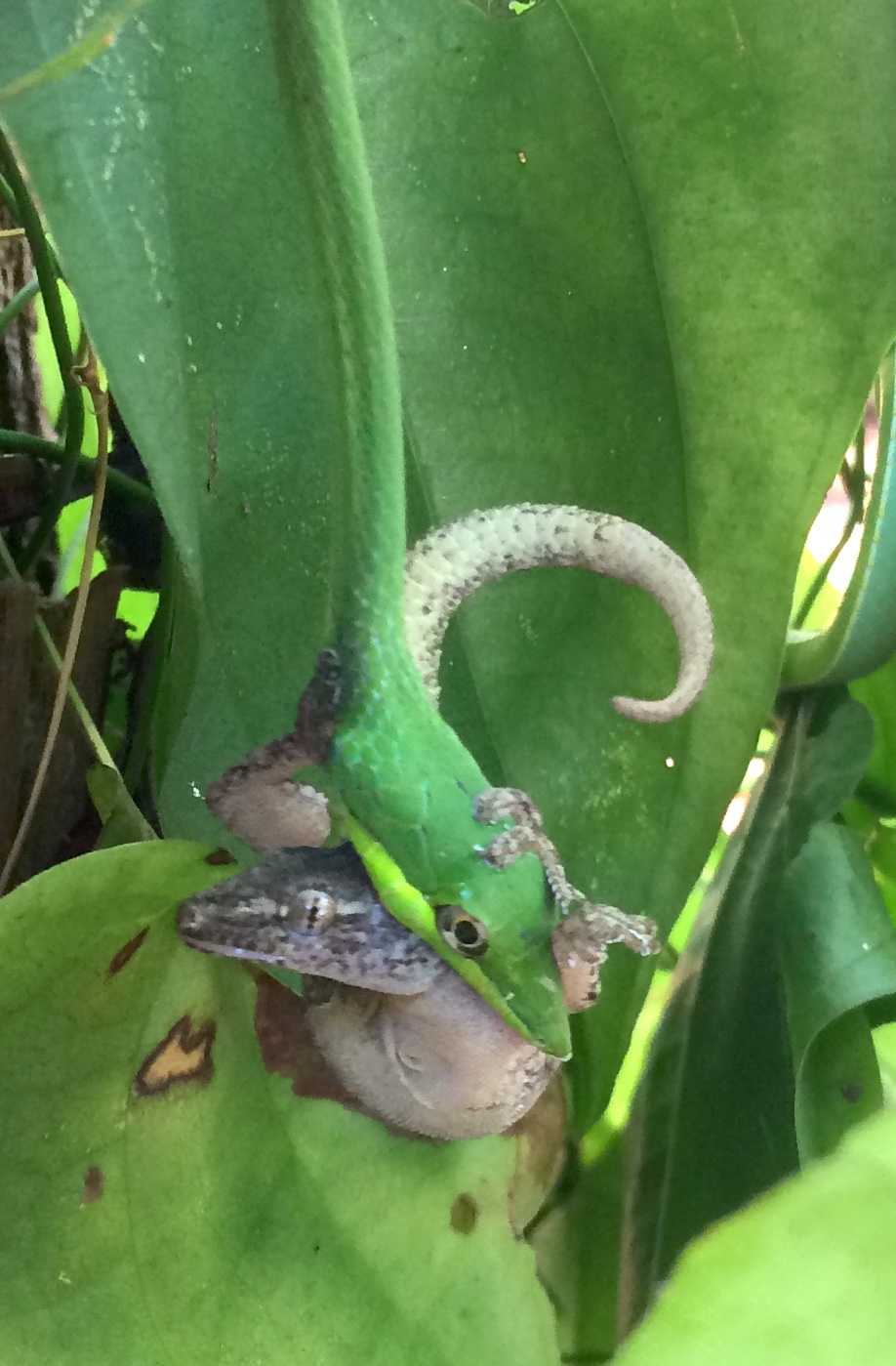
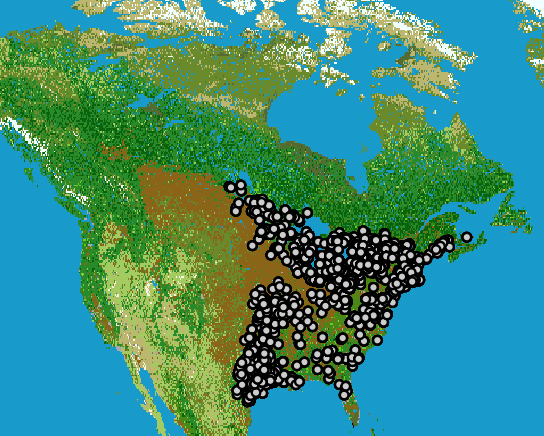
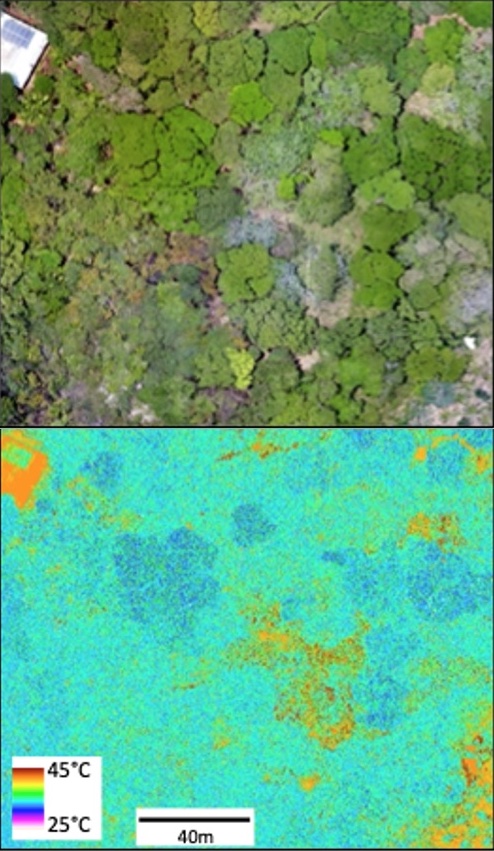
Undergrad Research Opportunities
Underlying the information/facts/knowledge that you have been accumulating thus far in your degree is a long history of research.
That history will be one of bold conjecture, rigorous data collection, toil, and failure - until, eventually, a tiny kernel of new, knowledge emerges.
Put that way, research sounds incredibly challenging (and a lot of hard work). It is, but it is also incredibly rewarding, because
you will learn something that is truly new - something that you, me, or anyone else, didn't know before. And that's pretty amazing.
If you're interested in learning more about what research is about, then there are a number of potential ways to engage in research
in the lab as part of your undergraduate degree. This may involve co-developing your own project with me or assisting
with ongoing projects. These are important learning experiences in their own right, but are also a great way to test out if you enjoy the research process.
Discussing new research ideas is one of the best parts of my job, so I'm happy to meet and discuss potential projects, even if you
have no idea what you want to work on!
Honour's Thesis (BIOL4101).
The Honour's Thesis is a great way to experience the full research cycle - from idea generation, proposing hypotheses, gathering and anaysing data to test predictions,
working out what the results mean and communicating your findings. To carry out a thesis, you need to find a supervisor - if you're interested in working with me,
email me (earlier the better) and we can discuss project ideas. There are opportunities to work on field- or big data/modelling-based projects.
Research Internships (BIOL3990/3991).
These courses are a great way to get research experience (usually) in your 3rd year, while getting credit toward your degree. They are 'work-terms' and so can be quite varied,
depending on the work that is going on in the lab during that semester, but you will be working on a project that is part of the lab's larger research program. We will tailor
this to ensure that you get a chance to develop the skills you are particularly interested in, and are working on topics you find particularly interesting.
If you're interested in working in my lab for a semester - get in touch and we can discuss options.
Check back regularly for new opportunities, including potential summer internships.
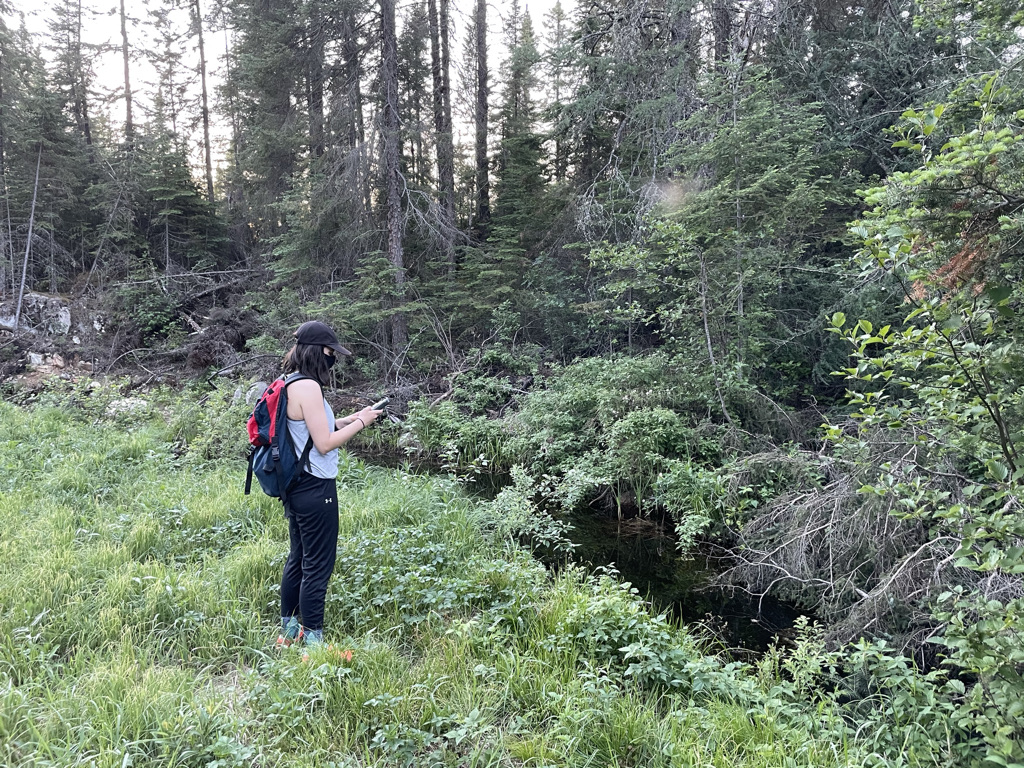
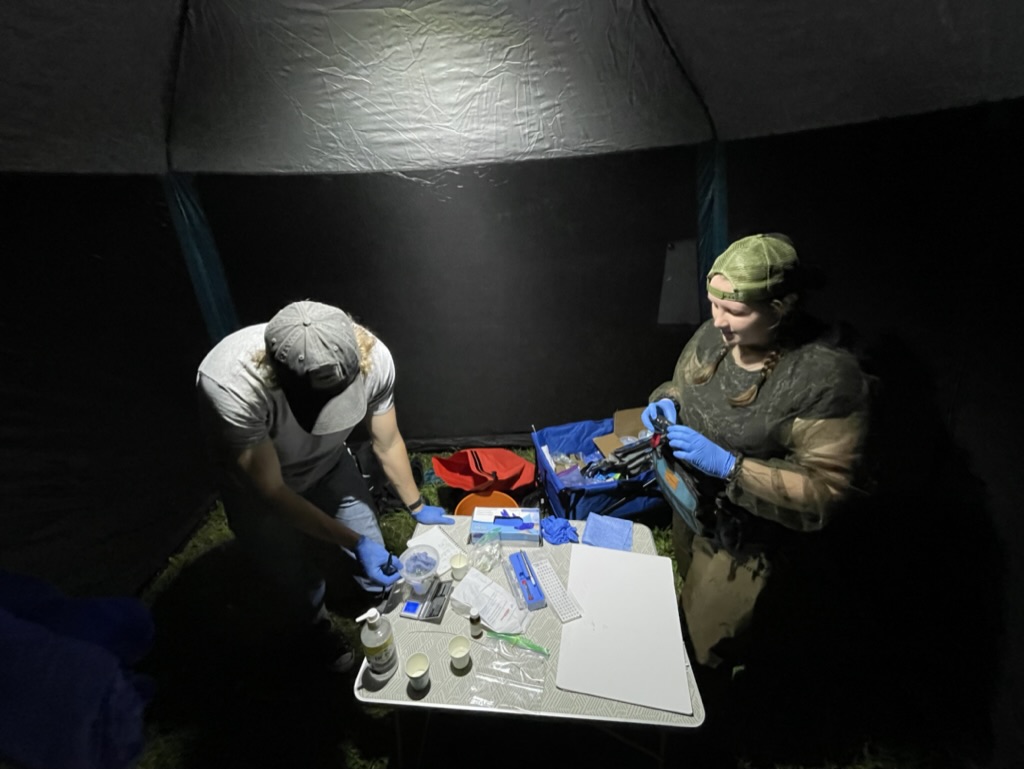
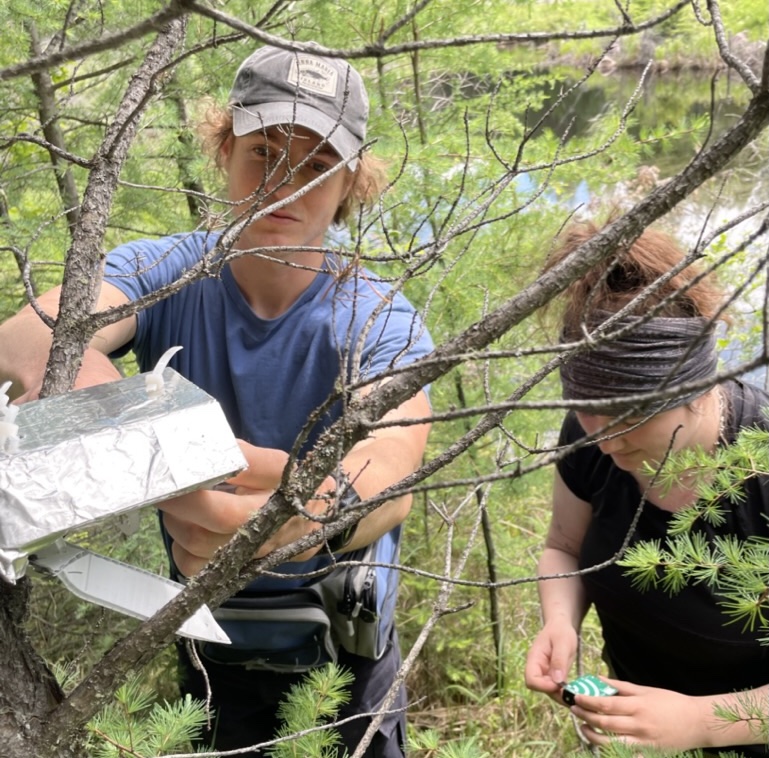
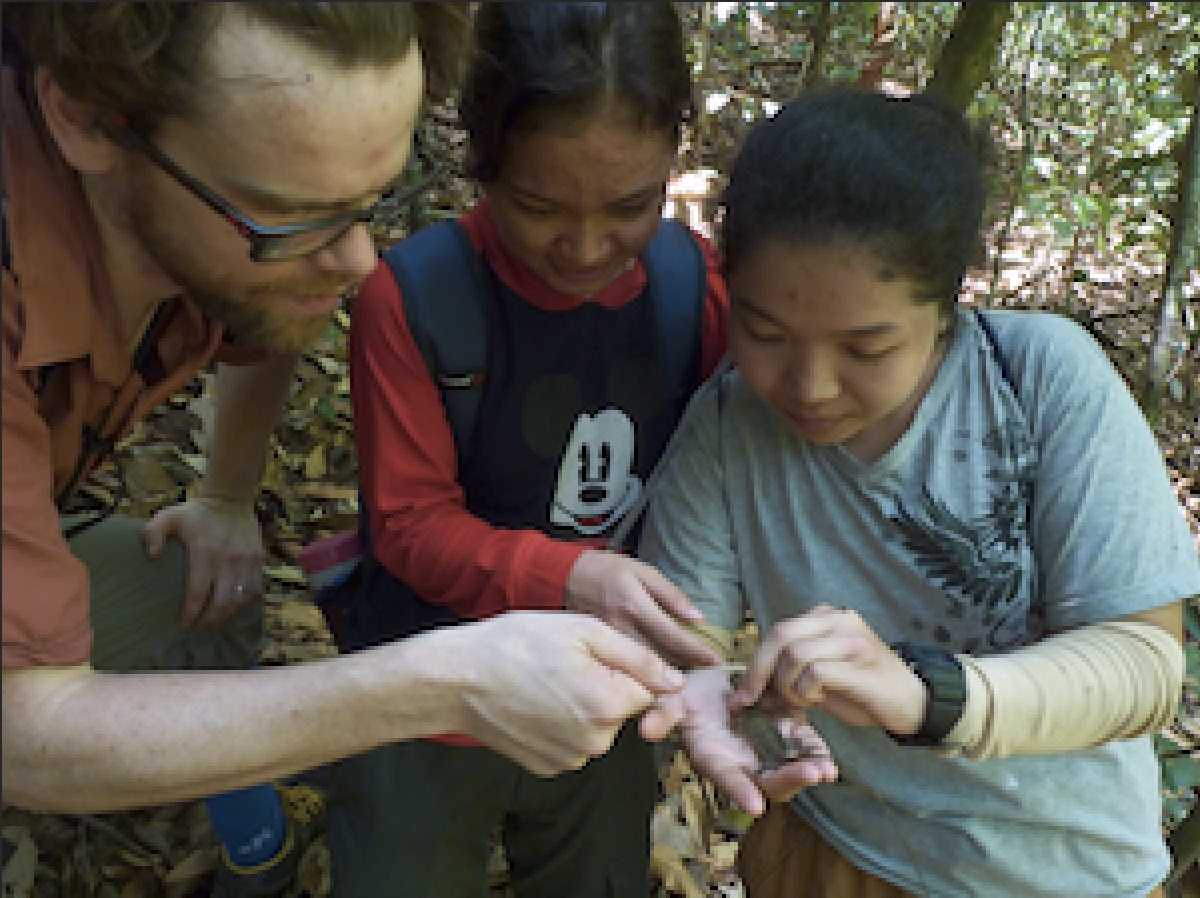
Diversity, Equity & Inclusion
Ecology, as a science, strives to understand the diversity of the natural world. However, it has
been far less understanding of, and open to, the diversity of those engaged in ecological research.
Like other sciences, ecology has a long history of exclusion, bias, discrimination, racism and colonialism. Many,
if not all, of these historical barriers remain. Breaking them down requires continual commitment from all
scientists. We have a responsibility to educate ourselves about this inequity, and work toward making ecology a diverse and inclusive discipline,
which can
only strengthen our science and our society.
As a research group, we are committed to:
Accessing these papers. The pay-to-publish open access model makes accessing the outcome of science more accessible, but it makes makes doing, and communicating, science less open. Instead it concentrates the dissemination of new knowledge within a small group of well-funded researchers who can pay thousands of dollars (or pounds, euros, etc.) to publish a single paper. And while many journals have fee waivers, high fees remain a huge deterrent/barrier. I don't have a solution, but I do think that the gatekeepers of science should be scientific editors and peer-reviewers, not a bank balance. The papers below can all be freely accessed, one way or another. For some we've been lucky/privileged enough to be able to pay open access fees. For paywalled papers, please email me (aalgar@lakeheadu.ca) and I'll send you a PDF for free - the original open access!
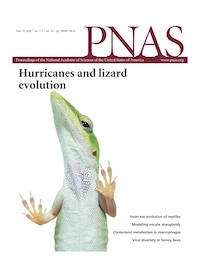
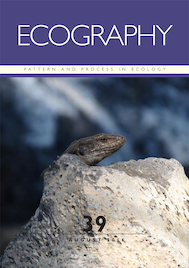
Leach, O., Lockhart, K., Algar, A.C. 2024. Terminal reproductive investment in male Eastern Gray Treefrogs (Dryophytes versicolor, Anura: Hylidae) is a marathon not a sprint. Biological Journal of the Linnean Society 143, blae114.
Herrera-Alsina, L., Lancaster, L.T., Algar, A.C., Bocedi, G, Papadopulos, A.S.T., Gubry-Rangin, C., Osborne, O.G., Mynard, P., Creer, S., Villegas-Patraca, R., Made, S.I., Fahri, F., Lupiyaningdyah, P., Nanhoy, M., Iskandar, D.T., Juliandi, B., Burslem, D.F.R.P., Travis, J.M.M. 2024. Accounting for extinction dynamics unifies the geological and biological histories of Indo-Australian Archipelago. Proceedings of the Royal Society B: Biological Sciences 291, 20240966.
Higgins, E.A., D.S. Boyd, T.W. Brown, S.C. Owen, G.M.F. Van Der Heijden, and A.C. Algar. 2024. Unoccupied aerial vehicles as a tool to map lizard operative temperature in tropical environments. Remote Sensing in Ecology and Conservation 10, 615-627.
Johnson, M.F., L.K. Albertson, A.C. Algar, S.J. Dugdale, P. Edwards, J. England, C. Gibbins, S. Kazama, D. Komori, A.D.C. MacColl, E.A. Scholl, R.L. Wilby, F. De Oliveira Roque, P.J. Wood. 2024. Rising water temperature in rivers: Ecological impacts and future resilience. WIREs Water 11:e1724.
Moore, N.A., I. Morales-Castilla, A. L. Hargreaves, M. Á. Olalla-Tárraga, F. Villalobos, P. Calosi, S. Clusella-Trullas, J.G. Rubalcaba, A.C. Algar, B. Martínez, L. Rodríguez, S. Gravel, J.M. Bennett, G.C. Vega, C. Rahbek, M.B. Araújo, J.R. Bernhardt, J.M. Sunday. 2023. Temperate species underfill their tropical thermal potentials on land. Nature Ecology & Evolution 7:1993–2003.
Hanz, D.M., V. Cutts, M.P. Barajas‐Barbosa, A.C. Algar, C. Beierkuhnlein, F. Collart, J.M. Fernández‐Palacios, R. Field, K.N. Karger, D.R. Kienle, H. Kreft, J. Patiño, F. Schrodt, M.J. Steinbauer, P. Weigelt, S.D.H. Irl. 2023. Effects of climate change on the distribution of plant species and plant functional strategies on the Canary Islands. Diversity and Distributions 29:1157–1171.
Munoz, F., Klausmeier, C.A., Gaüzère, P., Kandlikar, G., Litchman, E., Mouquet, N., Ostling, A., Thuiller, W., Algar, A.C., Auber, A., Cadotte, M.W., Delalandre, L., Denelle, P., Enquist, B.J., Fortunel, C., Grenié, M., Loiseau, N., Mahaut, L., Maire, A., Mouillot, D., Pimiento, C., Violle, C., Kraft, N.J.B. 2023. The ecological causes of functional distinctiveness in communities. Ecology Letters 26, 1452-1465.
Fell, H.G., Jones, M., Atkinson, S., Stenseth, N.C., Algar, A.C. 2023. The role of reservoir species in mediating plague's dynamic response to climate. Royal Society Open Science 10, 230021.
Cutts, V., Hanz, D.M., Barajas‐Barbosa, M.P., Schrodt, F., Steinbauer, M.J., Beierkuhnlein, C., Denelle, P., Fernández-Palacios, J.M., Gaüzère, P., Grenié, M., Irl, S.D.H., Kraft, N., Kreft, H., Maitner, B., Munoz, F., Thuiller, W., Violle, C., Weigelt, P., Field, R., Algar, A.C. 2023. Links to rare climates do not translate into distinct traits for island endemics. Ecology Letters 26, 504-515.
Mynard, P., Algar, A.C., Lancaster, L., Bocedi, G., Fahri, F., Gubry-Rangin, C., Lupiyaningdyah , P., Nangoy , M., Osborne, O., Papadopulos, A., Sudiana , I.M., Juliandi, B., Travis, J.M.J. & Herrera Alsina, L. 2023. Impact of phylogenetic tree completeness and misspecification of sampling fractions on trait dependent diversification models. Systematic Biology 72, 106-119
Gunn, R.L., Benkwitt, C.E., Graham, N.A.J., Hartley, I.R. Algar, A.C., Keith, S.A. 2023. Terrestrial invasive species alter marine vertebrate behaviour. Nature Ecology & Evolution 7:82–91.
Herrera-Alsina, L., Algar, A.C., Lancaster, L.T., Ornelas, J.F., Bocedi, G., Papadopulos, A.S.T., Gubry-Rangin, C., Osborne, O.G., Mynard, P., Sudiana, I.M., Lupiyaningdyah, P., Juliandi, B., Travis, J.M.J. 2022. The missing link in biogeographic reconstruction: accounting for lineage extinction rewrites history. Journal of Biogeography 49, 1941-1951.
Auber, A., Waldock, C., Maire, A., Goberville, E., Albouy, C., Algar, A.C., McLean, M., Brind'Amour, A., Green, A.L., Tupper, M., Vigliola, L., Kaschner, K., Kesner-Reyes, K., Beger, M., Tjiputra, J., Toussaint, A., Violle, C., Mouquet, N., Thuiller, W., Mouillot, D. 2022. A functional vulnerability framework for Biodiversity conservation. Nature Communications 13, 4774.
Hanz, D.M., Cutts, V., Barajas-Barbosa, M.P., Algar,A.C., Beierkuhnlein, C., Fernández-Palacios, J.-M., Field, R., kreft, H., Steinbauer, M.J., Weigelt, P., Irl, S.D.H. 2022. Climatic and biogeographical drivers of functional diversity in the flora of the Canary Islands. Global Ecology and Biogeography 31, 1313-1331.
Osborne, O.G., Fell, H.G., Atkins, H., van Tol, J., Phillips, D., Herrera-Alsina, L., Mynard, P., Bocedi, G., Gubry-Rangin, C., Lancaster, L.T., Creer, S., Nangoy, M., Fahri, F., Lupiyaningdyah, P., Sudiana, I.M., Juliandi, B., Travis, J.M.J., Papadopulos, A.S.T., Algar, A.C. 2022. Fauxcurrence: simulating multi-species occurrences for null models in species distribution modelling and biogeography. Ecography 2022, e05880.
Fell, H.G., Osborne, O.G., Jones, M.J., Atkinson, S., Tarr, S., Keddie, S., Algar, A.C. 2022. Biotic factors limit the invasion of plague's pathogen (Yersinia pestis) in novel geographical settings. Global Ecology and Biogeography 31, 672-684.
Gunn, R.L., Hartley, I.R., Algar, A.C., Nadiarti, N., Keith, S.A. 2022. Variation in the behaviour of an obligate corallivore is influenced by resource availability. Behavioral Ecology and Sociobiology. 76, 24.
Gunn, R.L., Hartley, I.R., Algar, A.C., Niemela, P.T., Keith, S.A. 2021. Understanding behavioural responses to human-induced rapid environmental change: a meta-analysis. Oikos 2022, e08366.
Higgins, E.A., Boyd, D.S., Brown, T., Owens, S., Algar, A.C. 2021. Disentangling controls on animal abundance: prey availability, thermal habitat, and microhabitat structure. Ecology and Evolution 11, 11414-11424.
Herrera-Alsina, L., Algar A.C., Bocedi G., Gubry-Rangin, C., Lancaster, L., Mynard, P., Osborne, O.G., Papadopulos, A.S.T., Creer, S., Nangoy, M., Fahri F., Lupiyaningdyah, P., Sudiana, I.M., Juliandi, B., Travis, J.M.J. 2021. Ancient geological dynamics impact neutral biodiversity accumulation and are detectable in phylogenetic reconstructions. Global Ecology & Biogeography 30, 1633-1642.
Mouillot, D., Loiseau, N., Grenié, M., Algar, A.C., Allegra, M., Cadotte, M.W., Casajus, N., Denelle, P., Guégan, M., Maire, A., Maitner, B., McGill, B.J., McLean, M., Mouquet, N., Muñoz, F., Thuiller, W., Villéger, S., Violle, C., Auber, A. 2021. The dimensionality and structure of species trait spaces. Ecology Letters 24, 1988-2009.
Bennett, J.M., Sunday, J., Calosi, P., Villalobos, F., Martínez, Molina-Venegas, R., Araújo, M.B., Algar, A.C., Clusella-Trullas, S., Hawkins, B.A., Keith, S., Kühn, I., Rahbek, C., Rodríguez, L, Singer, A., Morales-Castilla, I., Olalla-Tárraga, M.A. 2021. The evolution of critical thermal limits of life on Earth. Nature Communications 12, 1198.
Rodríguez Valido, C.A., Johnson, M.F., Dugdale, S.J., Cutts, V., Fell, H.G., Higgins, E.A., Tarr, S., Templey, C.M., Algar, A.C. 2020. Thermal sensitivity of feeding and burrowing activity of an invasive crayfish in UK waters. Ecohydrology 14, e2258.
Munro, A., Smallman-Raynor, M., Algar, A.C. 2020. Long-term changes in endemic threshold populations for pertussis in England and Wales: a spatiotemporal analysis of Lancashire and South Wales, 1940-69. Social Science & Medicine 288, 113295.
Donihue, C.M., Kowaleski, A.M., Losos, J.B., Algar, A.C., Baeckens, S., Buchkowski, R.W., Fabre, A.-C., Frank, H.K., Geneva, A.J., Reynolds, R.G., Stroud, J.T., Velasco, J.A., Kolbe, J.J., Mahler, D.L., Herrel, A. 2020. Hurricane effects on Neotropical lizards span geographic and phylogenetic scales. Proceedings of the National Academy of Sciences USA, 117, 10429-10434.
Cutts, V., Katal, N., Löwer, C., Algar, A.C., Steinbauer, M.J., Irl, S.D.H., Beierkuhnlein, C., Field, R. 2019. The effect of small-scale topography on patterns of endemism within islands. Frontiers in Biogeography, 11, e43737.
Roggatz, C.C., Fletcher, N., Benoit, D.M., Algar, A.C., Doroff, A., Wright, B., Wollenberg Valero, K.C., Hardege, J.D. 2019. Saxitoxin and tetrodotoxin bioavailability increases in future oceans. Nature Climate Change, 9, 840-844.
Tarr, S., Meiri, S., Hicks, J.J., Algar, A.C. 2018. A biogeographic reversal in sexual size dimorphism along a continental temperature gradient. Ecography, 42, 706-716.
Algar, A.C., Morley, K., Boyd, D.S. 2018. Remote sensing restores predictability of ectotherm body temperature in the world’s forests. Global Ecology & Biogeography, 27, 1412-1425.
Algar, A.C. Tarr, S. 2018. Fossils, phylogenies, and the evolving climate niche. Nature Ecology & Evolution, 2, 414-415 (Invited News & Views).
Velasco, J.A., Villalobos, F., Diniz-Filho, J.A.F., Algar, A.C., Flores-Villela, O., Köhler, G., Daza, J.M., Poe, S., Martínez-Meyer, E. 2018. Climatic and evolutionary factors shaping geographical gradients of species richness in Anolis lizards. Biological Journal of the Linnean Society, 123, 615-627.
Bennett, J.M., Calosi, P., Clusella-Trullas, S., Martínez, B., Sunday, J., Algar, A.C., Araújo, M.B., Hawkins, B.A., Keith, S., Kühn, I., Rahbek, C., Rodríguez, L., Singer, A., Villalobos, F., Olalla-Tárraga, M. Á., Morales-Castilla, I. 2018. GlobTherm, a global database on thermal tolerances for aquatic and terrestrial organisms. Scientific Data 5, 180022.
Tallowin, O., Allison, A., Algar, A.C., Kraus, F., Meiri S. 2017. Papua New Guinea terrestrial vertebrate richness: elevation matters most for all except reptiles. Journal of Biogeography 44, 1734-1744.
Algar, A.C. & López-Darias, M. 2016. Sex-specific responses of phenotypic diversity to environmental variation. Ecography 39, 715-725.
Dawson, M.N., Algar, A.C., Heaney, L.R., Stuart, Y.E. 2016. The evolutionary biogeography of islands, lakes, and mountaintops. In Kliman, R.M. (Ed.). The Encyclopedia of Evolutionary Biology. Volume 1, pp. 203-210. Oxford: Academic Press.
Algar, A.C. & Mahler, D.L. 2016. Area, climate heterogeneity, and the response of climate niches to ecological opportunity in island radiations of Anolis lizards. Global Ecology & Biogeography 25, 781-791.
Velasco, J.A., Martínez-Meyer, E., Flores-Villela, O., García-Aguayo, A., Algar, A.C., Köhler, G., Daza, J.M. 2016. Climatic niche attributes and diversification in Anolis lizards. Journal of Biogeography 43, 134-144. Highlighted in the GBIF Science Review 2016.
Muñoz, M.M., Wegener, J.E., Algar, A.C. 2014. Untangling intra- and interspecific effects on body size clines reveals divergent processes structuring convergent patterns in Anolis lizards. The American Naturalist 184, 636-646.
Muñoz, M.M., Stimola, M.A., Algar, A.C., Conover, A. Rodriguez, A.J., Landestoy, M.A., Bakken, G.S., Losos, J.B. 2014. Evolutionary stasis and lability in thermal physiology in a group of tropical lizards. Proceedings of the Royal Society B 281, 20132433.
Graham, L.J., Bailey, J.J., Algar, A.C., Field, R. 2014. Where next for macroecology: citizen macroecology? Frontiers of Biogeography 6, 16-19.
Algar, A.C., Mahler, D.L., Glor, R.E., Losos, J.B. 2013. Niche incumbency, dispersal limitation, and climate shape geographical distributions in a species-rich island adaptive radiation. Global Ecology & Biogeography 22, 391-402.
Altamirano, A., Aplin, P., Miranda, A., Cayuela, L., Algar, A.C., Field, R. 2013. High rates of forest loss and turnover obscured by classical landscape measures. Applied Geography 40, 199-211.
Dawson, M.N., Algar, A.C. et al. 2013. An horizon scan of biogeography. Frontiers of Biogeography 5, 130-157.
Stuart, Y.E., Losos, J.B., Algar, A.C. 2012. The island–mainland species turnover relationship. Proceedings of the Royal Society B 279, 4071-4077.
Algar, A.C. 2012. Biogeography by geographers. Frontiers of Biogeography 4, 61-62.
Algar, A.C. & Losos, J.B. 2011. Evolutionary assembly of island faunas reverses the classic island-mainland richness difference in Anolis lizards. Journal of Biogeography 38, 1125-1137. Selected for virtual special issue on advances in species-area research.
Algar, A.C., Kerr, J.T., Currie, D.J. 2011. Quantifying the importance of regional and local filters for community trait structure in tropical and temperate zones. Ecology 92, 903-914.
Kerr, J.T., Kulkarni, M., & Algar, A.C. 2011. Integrating theory and predictive modeling for conservation research. In Drew, C.A., Huettmann, F., Wiersma, Y.F. (Eds.). Predictive Modeling in Landscape Ecology. Springer, New York.
Algar, A.C., Kharouba, H.M., Young, E.R., & Kerr, J.T. 2009. Predicting the future of species diversity: macroecological theory, climate change, and direct tests of alternative forecasting methods. Ecography 32, 22-33.
Szabo, N.D.* Algar, A.C.*, Kerr, J.T. 2009. Reconciling topographic and climatic effects on widespread and range-restricted species richness. Global Ecology & Biogeography 18, 735-744. *Contributed equally as first authors.
Algar, A.C., Kerr, J.T., & Currie, D.J. 2009. Evolutionary constraints on regional faunas: whom, but not how many. Ecology Letters 12, 57-65.
Kharouba, H.M., Algar, A.C., & Kerr, J.T. 2009. Historically calibrated predictions of butterfly species' range shift using global change as a pseudo-experiment. Ecology 90, 2213-2222.
Algar, A.C., Kerr, J.T., & Currie, D.J. 2007. A test of metabolic theory as the mechanism underlying broad-scale species richness gradients. Global Ecology & Biogeography 16, 170-178.
Algar, A.C., Sleep, D., & Nudds, T.D. 2005. Niches, null models, and forest birds: testing competing community assembly hypotheses in disturbed and undisturbed hardwood forest. Écoscience 12, 574-580.
Land Acknowledgement
We respectfully acknowledge that Lakehead University's campuses are located on the traditional lands of Indigenous peoples.
Lakehead Thunder Bay is located on the traditional lands of the Fort William First Nation, signatory to the Robinson Superior Treaty of 1850. Lakehead Orillia is located on the traditional territory of the Anishinaabeg. The Anishinaabeg include the Ojibwe, Odawa, and Pottawatomi nations, collectively known as the Three Fires Confederacy.
Lakehead University acknowledges the history that many nations hold in the areas around our campuses, and is committed to a relationship with First Nations, Métis, and Inuit peoples based on the principles of mutual trust, respect, reciprocity, and collaboration in the spirit of reconciliation
Additionally, we respectfully acknowledge that our fieldwork in multiple places around the world has been located on the ancestral and traditional lands of a diverse
set of Indigenous peoples. This likely includes unceded territory. The very fact that we do not know this for sure demonstrates that we need to continue and improve our commitment to furthering our understanding of the history of the lands on which we
carry out fieldwork, and improve our understanding and engagement with the traditional and current peoples living and working in these areas.
Evolutionary Concepts (BIOL3671)
There is grandeur in this view of life . . . from so simple a beginning endless forms
most beautiful and most wonderful have been, and are being, evolved
- Charles Darwin
This course will introduce you to the fundamentals of evolution across scales of biological organization
from genomic change to global biodiversity. To do so, we will travel from a Victorian naturalist's home in
England, to the Greater Antilles, glacial lakes in British Columbia, and a very important freezer in a
Michigan lab. Along the way, we will meet some of the people who have proposed theory, tested hypotheses,
and shaped our evolutionary understanding, from Alfred Russell Wallace to Rosemary Grant. Throughout the
class, I hope that not only will you gain an understanding of key evolutionary concepts, but also of why
it is one of the most beautiful, elegant, and important ideas in the history of humankind.
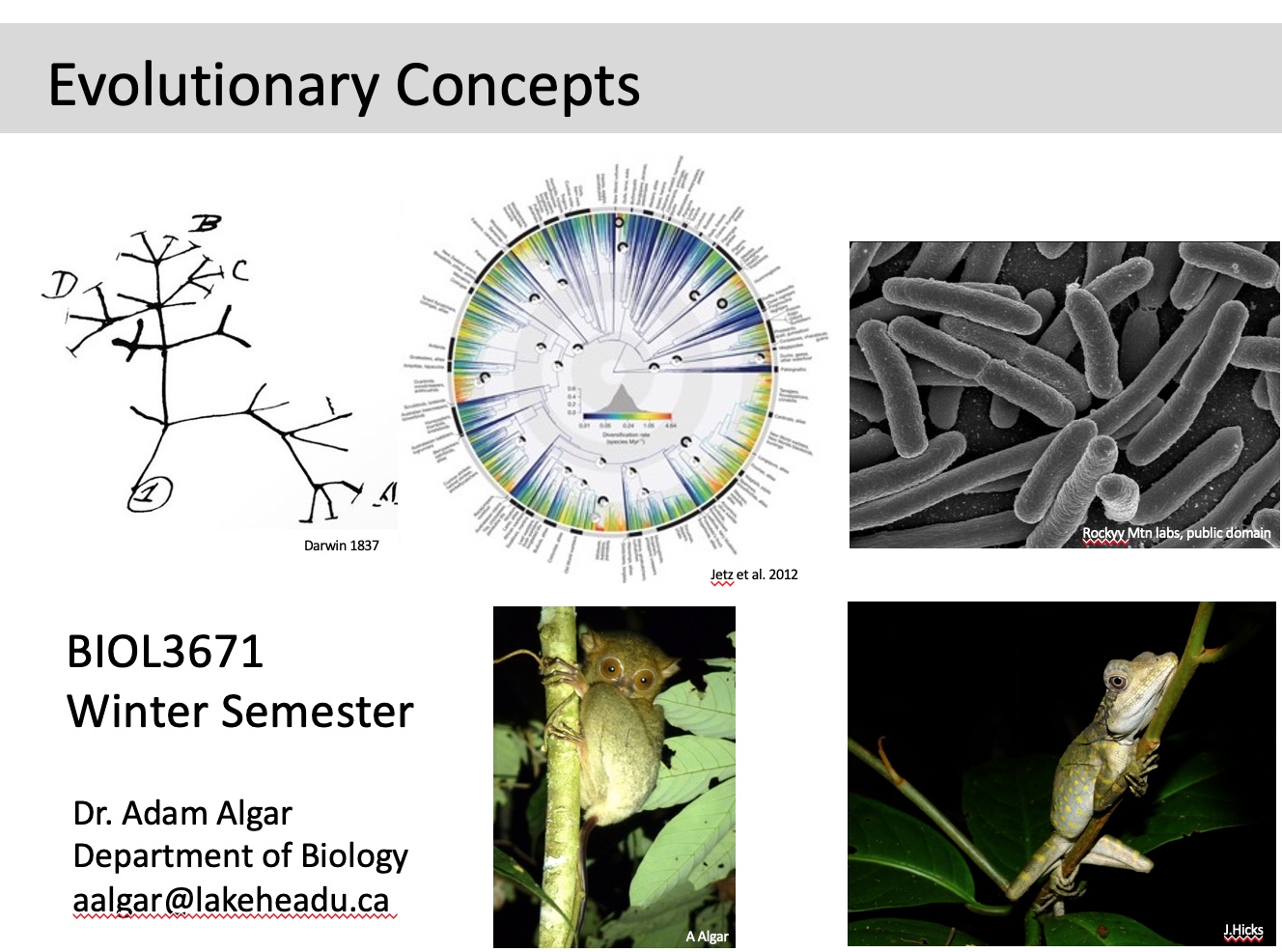
Community Ecology (BIOL4113)
To do science is to search for repeated patterns, not simply to accumulate facts
- Robert H. MacArthur
All environments on Earth—from desert to deep ocean, tropical rainforest to urban centre—harbour their own set of
species, some unique and some shared, but all striving to survive and reproduce. Community
Ecology is the study of these collections of species. It attempts to understand how these species came to occur
together in space and time, and if, why, and how they will continue to persist together. It celebrates what makes
communities different from each other, but at the same time it searches for common processes and properties that
transcend these differences. It is in this search for the general principles generating, regulating, and changing
these sets of species that we will discover the science behind the study of ecological communities.
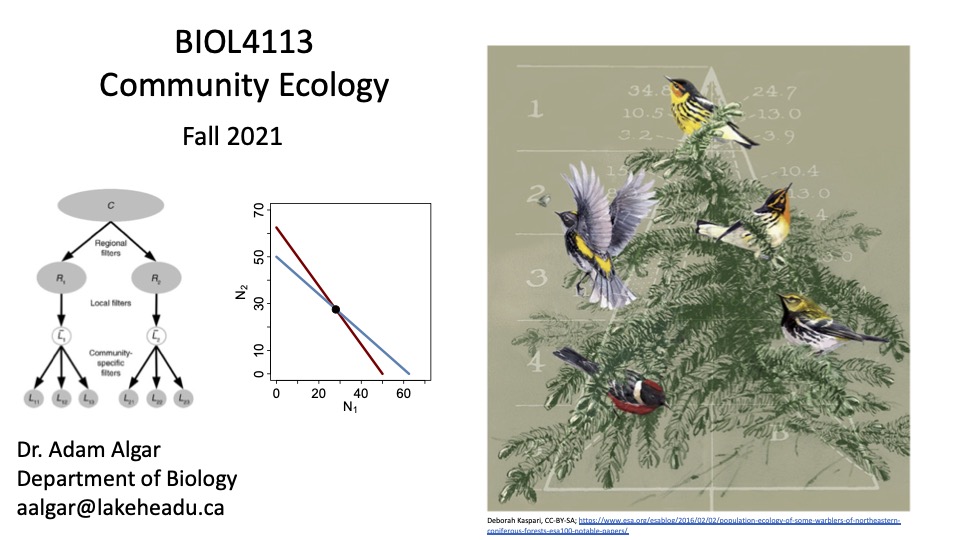
Biogeography (BIOL3151)
If we travel beyond our district in various directions we shall almost certainly meet with something new to us; some species which we were accustomed to see almost daily will disappear, others which we have never seen before will make their appearance.
- Alfred Russell Wallace
Inspiring words to come!
